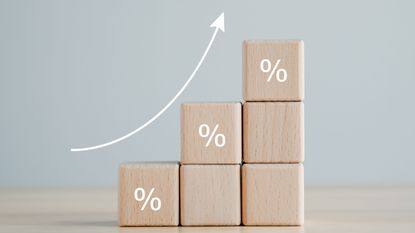Is High-Yield Savings Account Interest Taxable?
Savings account interest is taxable but don't let that scare you away from a high-yield savings account. Here's what you need to know.
- (opens in new tab)
- (opens in new tab)
- (opens in new tab)
- Newsletter sign up Newsletter


Now is a good time to earn savings account interest. The Federal Reserve raised interest rates yet again — to a 15-year high. While high-interest rates might be bad news for mortgage loan shoppers, it's good news for saving account rates. That's because when interest rates are high, interest on savings accounts increases, and the popularity of high-yield savings accounts typically increases too. For example, a recently launched Apple savings account offers a 4.15% interest rate. But wait! There are some taxes involved with your savings account that you need to know about.
High-Yield Savings vs. Regular Savings
Before diving into an explanation of how interest income from your savings account is taxed, it’s good to know the difference between a regular savings account and a high-yield savings or high-interest savings account. The latter has a higher interest rate than regular or traditional savings accounts. Interest earned on both types of savings accounts is considered taxable income by the IRS. Also, interest earned from other types of accounts like money market accounts, certificates of deposit (CDs), and interest-bearing checking accounts is also generally considered taxable income.
But because you are earning more interest income from a high-yield savings account, the amount that is subject to tax is typically greater. However, you are also earning more money on your savings in what is usually an FDIC-insured account. So consider the pros and cons of having some of your money in a high-yield savings account.

Sign up for Kiplinger’s Free E-Newsletters
Profit and prosper with the best of expert advice on investing, taxes, retirement, personal finance and more - straight to your e-mail.
Profit and prosper with the best of expert advice - straight to your e-mail.
How Savings Account Interest is Taxed
While you won’t owe taxes on the principal account balance in your savings account, any savings account interest earned is considered taxable income. The IRS taxes interest from high-yield savings accounts (and traditional interest-bearing savings accounts) at the same rate they tax other income (e.g., from your job). Any money you accumulate in interest is added to your other taxable income.
- The amount that you owe on interest income is based on your federal income tax bracket. So generally, the higher your income, the higher your tax bracket and the more tax you could owe on your interest income.
- Your income tax bracket is tied to a federal tax rate that is based on your filing status and taxable income from all sources, including interest).
There is some good news, though. Since the IRS adjusts federal income tax brackets each year for inflation, you could pay a lower tax rate for 2023 than you paid last year.
So, for example, let’s say that you earn $10,000 in interest income and your marginal tax rate is 22% based on your 2023 federal income tax bracket. Using that information, the tax on your savings account interest would generally be $2,200.
On the other hand, if you have $20,000 in your high-yield savings account and earn 3.75% interest, you would not be taxed on the $20,000, which is your savings account principal balance. Instead, you would only be taxed on the 3.75% you earned in interest.
Note: Some people might be subject to an additional tax called the Net Investment Income Tax (opens in new tab) (NIIT). NIIT is currently a 3.8% tax on capital gains, rental property income, and dividend income for filers with higher incomes.
Here are the federal marginal tax rates for 2023.
| Tax Rate | Single or Married Filing Separately | Head of Household | Married Filing Jointly |
| 10% | Up to $11,000 | Up to $15,700 | Up tp $22,000 |
| 12% | $11,001 to $44,725 | $15,701 to $59,850 | $22,001 to $89,450 |
| 22% | $44,726 to $95,375 | $59,851 to $95,350 | $89,451 to $190,750 |
| 24% | $95,376 to $182,100 | $95,351 to $182,100 | $190,751 to $364,200 |
| 32% | $182,101 to $231,250 | $182,101 to $231,250 | $364,201 to $462,500 |
| 35% | $231,251 to $578,100 (or to $346,875 for MFS) | $231,251 to $578,100 | $462,501 to $693,750 |
| 37% | More than $578,100 ($346,875 for MFS) | More than $578,100 | More than $693,750 |
How Much Savings Account Interest Income is Taxable?
All of your high-yield savings account interest is taxable. Your financial institution will send you a Form 1099-INT once you earn more than $10 in interest. However, the IRS still requires that you report any savings interest earned, even if the amount you earn is under the ten-dollar threshold. You report savings account interest income on your tax return in the year it is earned.
Note: You might also need to pay income tax on interest earned at the state level. Most states consider interest from high-yield savings accounts taxable. Even New Hampshire, which is a state with no income tax, has a special income tax for interest income.
Have Savings Account Interest Rates Peaked?
The Fed indicated that it might be done raising interest rates — at least for a while. So, that could mean that savings account interest rates may be at their peak. But if you’re interested in a high-yield savings account, don’t necessarily avoid it because of the taxable interest.
There are several tax strategies from tax loss harvesting to holding savings in a 401(k) or IRA that can potentially minimize your overall tax burden so that you avoid paying taxes on savings account interest.
- Consult a trusted professional tax professional or financial planner if you are unsure whether a high-yield savings account is the right move for you this year.
- Also, check out Kiplinger’s coverage of the best no-fee high-yield savings rates for 2023.

Katelyn has more than 6 years’ experience working in tax and finance. While she specializes in tax content, Katelyn has also written for digital publications on topics including insurance, retirement and financial planning and has had financial advice commissioned by national print publications. She believes that knowledge is the key to success and enjoys helping others reach their goals by providing content that educates and informs.
-
-
 Deeper Regional Banking Crisis Unlikely after Triple Failure: Kiplinger Economic Forecasts
Deeper Regional Banking Crisis Unlikely after Triple Failure: Kiplinger Economic ForecastsEconomic Forecasts Deeper Regional Banking Crisis Unlikely after Triple Failure: Kiplinger Economic Forecasts
By Rodrigo Sermeño • Published
-
 Spending Cuts Could Trigger Deeper Slowdown: Kiplinger Economic Forecasts
Spending Cuts Could Trigger Deeper Slowdown: Kiplinger Economic ForecastsEconomic Forecasts Spending Cuts Could Trigger Deeper Slowdown: Kiplinger Economic Forecasts
By David Payne • Published
-
 Half of Mothers Have Little or No Retirement Savings
Half of Mothers Have Little or No Retirement SavingsMother’s Day is here, but many moms face future financial insecurity because they have little or no retirement savings.
By Kelley R. Taylor • Last updated
-
 Having a Baby Could Soon Cost Less in These States
Having a Baby Could Soon Cost Less in These StatesHaving a baby is expensive, but these states are trying to make it less costly by eliminating the tax on diapers.
By Katelyn Washington • Published
-
 The Most Expensive States to Die In (Due to Death Taxes)
The Most Expensive States to Die In (Due to Death Taxes)You probably know the cost of living in your state, but what about the cost of dying — death taxes?
By Katelyn Washington • Published
-
 2023 Georgia Tax Rebates Up to $500 Are Now Being Sent
2023 Georgia Tax Rebates Up to $500 Are Now Being SentGeorgia has started sending special 2023 surplus tax refunds to eligible residents.
By Kelley R. Taylor • Published
-
 Is Your Scholarship Tax-Free or Taxable?
Is Your Scholarship Tax-Free or Taxable?Scholarships are generally tax-free if certain IRS and other requirements are met.
By Kelley R. Taylor • Published
-
 Oklahoma Storm Victims Have an Extended IRS Tax Deadline
Oklahoma Storm Victims Have an Extended IRS Tax DeadlineOklahoma taxpayers impacted by severe April storms have an extended tax filing and tax payment deadline.
By Katelyn Washington • Published
-
 10 States With the Lowest Sales Tax
10 States With the Lowest Sales TaxDon't rush to a state with low sales tax if your goal is to save money.
By Katelyn Washington • Published
-
 How to Lower Your Tax Bill Next Year
How to Lower Your Tax Bill Next YearKnowing how to lower your tax bill (pay less taxes) when it's time to file your return next year requires some strategizing through the rest of 2023. Here are some tax tips to help make it happen.
By Katelyn Washington • Published









